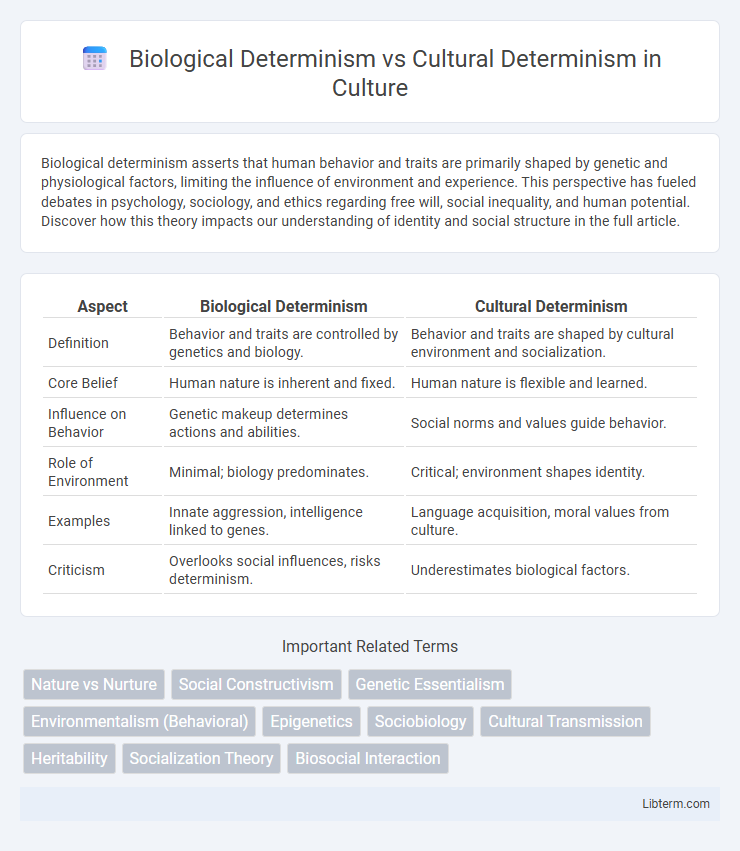Biological determinism asserts that human behavior and traits are primarily shaped by genetic and physiological factors, limiting the influence of environment and experience. This perspective has fueled debates in psychology, sociology, and ethics regarding free will, social inequality, and human potential. Discover how this theory impacts our understanding of identity and social structure in the full article.
Table of Comparison
| Aspect | Biological Determinism | Cultural Determinism |
|---|---|---|
| Definition | Behavior and traits are controlled by genetics and biology. | Behavior and traits are shaped by cultural environment and socialization. |
| Core Belief | Human nature is inherent and fixed. | Human nature is flexible and learned. |
| Influence on Behavior | Genetic makeup determines actions and abilities. | Social norms and values guide behavior. |
| Role of Environment | Minimal; biology predominates. | Critical; environment shapes identity. |
| Examples | Innate aggression, intelligence linked to genes. | Language acquisition, moral values from culture. |
| Criticism | Overlooks social influences, risks determinism. | Underestimates biological factors. |
Understanding Biological Determinism
Biological determinism asserts that human behavior, intelligence, and social structures are fundamentally shaped by genetic and physiological factors. This perspective emphasizes the role of inherited traits, such as DNA, hormones, and brain structures, in influencing individual differences and predispositions. Understanding biological determinism involves analyzing how evolutionary biology and neurogenetics contribute to patterns of human development and social organization.
Defining Cultural Determinism
Cultural determinism asserts that human behavior, values, and social structures are primarily shaped by cultural factors rather than biology or genetics. It emphasizes the role of learned customs, language, and societal norms in forming individual identity and decision-making processes. This perspective contrasts with biological determinism by attributing human development to environmental and cultural influences instead of innate biological traits.
Historical Roots of Each Perspective
Biological determinism traces its historical roots to 19th-century scientific theories such as Darwinism and eugenics, emphasizing genetic inheritance and physiological factors as primary influences on human behavior and social structures. Cultural determinism, emerging prominently in early 20th-century anthropology and sociology, argues that human behavior is shaped predominantly by learned cultural norms, socialization processes, and environmental contexts. Key figures like Franz Boas challenged biological determinism by promoting cultural relativism, thereby reshaping debates about nature versus nurture in human development.
Key Theories and Proponents
Biological determinism, championed by theorists such as E.O. Wilson and Herbert Spencer, argues that genetics and neurobiology primarily shape human behavior and societal structures, emphasizing innate, evolutionary influences. Cultural determinism, advocated by figures like Clifford Geertz and Franz Boas, posits that human actions and social patterns are predominantly molded by cultural contexts, learned behaviors, and symbolic systems. The debate between these theories centers on the extent to which biology versus culture governs identity, behavior, and social organization across human populations.
Nature vs. Nurture: The Ongoing Debate
Biological determinism asserts that genetics and innate biological factors predominantly shape human behavior, emphasizing nature's role in development. Cultural determinism counters this by highlighting the influence of environmental, social, and cultural contexts, prioritizing nurture over genetics. The ongoing nature versus nurture debate centers on the complex interaction between inherited traits and experiential learning in forming identity and behavior.
Case Studies in Biological Determinism
Case studies in biological determinism highlight genetic influences on human behavior, such as the role of the MAOA gene variant linked to aggression in violent offenders. Research on twin studies demonstrates heritability estimates for intelligence and personality traits, emphasizing biological contributions over environmental factors. Studies of neurological disorders, including Huntington's disease, further underscore the impact of genetic determinants on physiological and cognitive outcomes.
Case Studies in Cultural Determinism
Case studies in cultural determinism emphasize how societal norms, values, and traditions shape human behavior more than innate biological factors. For example, Margaret Mead's research in Samoa highlighted how adolescence experiences vary widely due to cultural influences rather than biological universality. Similarly, Bronislaw Malinowski's work in the Trobriand Islands demonstrated that kinship systems and social roles are culturally constructed, underscoring the primacy of culture in determining individual actions.
Criticisms and Limitations of Each Approach
Biological determinism faces criticism for oversimplifying human behavior by attributing it solely to genetics, ignoring the influence of environment and culture. Cultural determinism is limited by its tendency to overlook innate biological factors and assumes that social environment completely shapes human actions. Both approaches often fail to account for the dynamic interplay between biology and culture, leading to incomplete explanations of human behavior.
Modern Perspectives: Integrative Models
Modern perspectives on biological determinism versus cultural determinism emphasize integrative models that recognize the dynamic interplay between genetic predispositions and socio-cultural influences. These approaches leverage epigenetics and neuroplasticity research to demonstrate how environmental factors can modify genetic expression, shaping behavior and cognition. Contemporary studies prioritize a holistic understanding, highlighting that neither biology nor culture alone fully explains human development and social diversity.
Future Directions in Human Behavior Research
Future human behavior research must integrate genetic, neurobiological, and environmental data to move beyond the binary of biological determinism versus cultural determinism. Advances in epigenetics and neuroplasticity highlight the dynamic interplay between inherited traits and cultural influences in shaping behavior. Emerging interdisciplinary approaches leveraging big data analytics and machine learning will enable more precise modeling of how biology and culture co-construct human actions and social outcomes.
Biological Determinism Infographic

 libterm.com
libterm.com